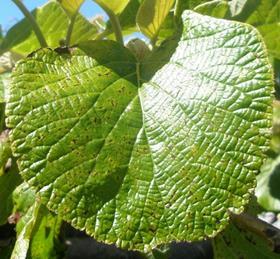
A kiwifruit orchard in New Zealand’s North Island has been placed under quarantine after showing symptoms of the bacterial vine infection kiwifruit canker that has caused widespread damage to Gold kiwifruit production in Italy.
According to MAF Biosecurity New Zealand (MAFBNZ), a preliminary test suggested that a strain of the bacterial vine disease Pseudomonas syringae pv actinidiae (PSA) – otherwise known as kiwifruit canker – may be present on some vines on the North Island-based orchard.
MAFBNZ is now working closely with Zespri, Plant & Food Research and New Zealand Kiwifruit Growers Inc to confirm whether the vine infection is PSA, with the results expected by Wednesday.
In the meantime, government and industry bodies are taking measures to minimise the risk of the infection spreading, amid grave concerns over the potential impact on what is New Zealand’s largest horticultural industry.
In a press statement, Biosecurity Minister David Carter reassured kiwifruit growers that the government was “treating the case very seriously, and making all necessary resources available”.
“The potential risk to our kiwifruit industry is being taken seriously,” Mr Carter said. “While the strain of the disease is not yet known, all necessary precautions have been put in place to avoid the disease spreading. It’s imperative that a considered and responsible approach to this potential threat is taken by all primary sector stakeholders while the kiwifruit industry and government works out exactly what we are dealing with.”
New Zealand kiwifruit marketer Zespri called an emergency meeting of growers and post-harvest operators on Sunday evening to keep industry leaders up to date on the current situation and encourage best-practice orchard hygiene.
“There’s a long list of unknowns at this stage,” Zespri CEO Lain Jager told Fruitnet.com. “For instance, if it is PSA, what strain of the disease is it? How virulent is it and how localised is it?”
New Zealand has never had any confirmed cases of PSA, and Mr Jager said that any potential outbreak was “potentially serious for the industry”, while cautioning that it was too early to determine the likely impact. This would depend on several factors, such as what strain of PSA the industry was dealing with and how it behaved in local growing conditions.
“Some strains of PSA are more virulent than others, and a lot depends on the growing environment. Cold and wet conditions can bring it on,” he noted.
The bacterial disease has already caused extensive damage to kiwifruit production in Italy, where it was first discovered in 1992. The outbreak there has intensified over the past year, taking an even stronger hold on production, notably in Italy’s main kiwifruit production area in Lazio but also further north in Emilia-Romagna. Yellow-fleshed kiwifruit has proven particularly susceptible, with an estimated 9m euros of sales forecast to be lost this season alone in Lazio as a result of this year’s outbreak.
Zespri is only too familiar with the problem, since it has claimed large swathes of its Gold kiwifruit plantings in Italy, the Northern Hemisphere country that underpins its off-season supplies. “There’s been a severe impact on the Gold crop in Italy,” Mr Jager confirmed. “Over half of the production over there (in Latina) has been affected.”
The fact that the Gold variety (Hort16A) now forms a key part of New Zealand’s kiwifruit production is a cause for concern with any potential outbreak of PSA, Mr Jager added.
Green kiwifruit, meanwhile, has shown a greater resistance to PSA in Italy and other parts of the world. Indeed, Japan, where the disease was first indentified on kiwifruit vines 25 years ago, has been able to keep it under control and maintain production through appropriate agricultural practices.
Besides the potential impact on New Zealand’s production, there are also major implications in terms of market access. MAFBNZ has already informed the country’s trading partners of the situation, Mr Jager noted.
“From a market access point of view, PSA is already present in Japan, Korea and Italy, but some markets could close their borders (if it turns out that PSA is present in New Zealand),” he said. “China is a potential risk in that regard.”
Whatever the outcomes, the impact for the current season is likely to be limited as the export campaign is almost over.
Zespri is currently seeking to gauge how widespread the disease issue may be in orchards. The company has instructed growers to check orchards for symptoms of PSA and issued them with a detailed information sheet with clear protocols explaining how to identify symptoms and what measures to take. It has also urged them to step up orchard hygiene, which is a critical issue in preventing the movement of any bacteria from infected to uninfected orchards given that the bacteria spreads through the air.
There is also a potential threat of the bacterial disease being spread by bees that are used to pollinate crops, especially with vines currently coming into flowering in New Zealand. 'There's a lot of pollen around now,' Mr Jager warned.
Kiwifruit represents New Zealand’s largest horticultural export industry, with an annual value estimated at some NZ$1.5bn.



